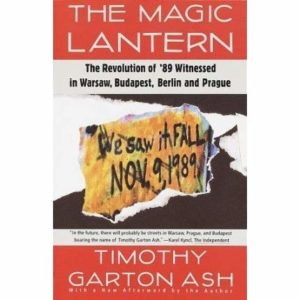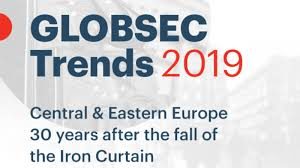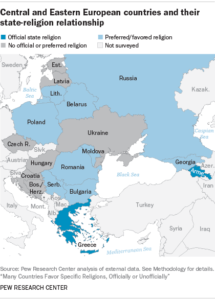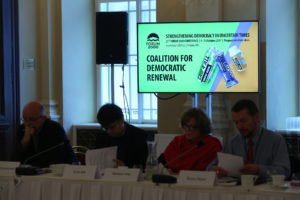 On the tenth anniversary of 1989, at the brink of the millennium, we could celebrate both the original triumph of the velvet revolutions and great subsequent progress. By the twentieth anniversary, in 2009, the countries of Central Europe had become members of both NATO and the EU, while political scientists described Hungary as a “consolidated democracy.” On this thirtieth anniversary, by contrast, the question that forces itself onto dismayed lips is “What went wrong?” notes Timothy Garton Ash, Professor of European Studies and Isaiah Berlin Professorial Fellow at St. Antony’s College, Oxford, and a Senior Fellow at the Hoover Institution, Stanford.
On the tenth anniversary of 1989, at the brink of the millennium, we could celebrate both the original triumph of the velvet revolutions and great subsequent progress. By the twentieth anniversary, in 2009, the countries of Central Europe had become members of both NATO and the EU, while political scientists described Hungary as a “consolidated democracy.” On this thirtieth anniversary, by contrast, the question that forces itself onto dismayed lips is “What went wrong?” notes Timothy Garton Ash, Professor of European Studies and Isaiah Berlin Professorial Fellow at St. Antony’s College, Oxford, and a Senior Fellow at the Hoover Institution, Stanford.
“The West’s mistake after 1989 was not that we celebrated what happened in Berlin, Prague, Warsaw, and Budapest as a triumph of liberal, European, and Western values. It was all of that. Our mistake was to imagine that this was now the norm, the new normal, the way history was going. ……And two generations of journalists—those who were there when the wall came down, and those who wished they had been—misread the Arab Spring as another 1989. Thirty years on, we can see that, far from being the new normal, what happened in Europe in 1989 was a great historical exception, unique, one of a kind,” he writes for the New York Review of Books:
 If “the West” means abortion, gay marriage, and LGBT+ rights, socially conservative Central Europeans will be against it…..Today’s China is as much a product of 1989 as are the fragile democracies of Central Europe. To avoid Gorbachev’s fate, Xi Jinping and his fellow party leaders have systematically learned lessons from the collapse of communism in the Soviet bloc. Along the way, as much by improvisation as by design, they have created an unprecedented hybrid system that might be described as Leninist capitalism. Since 2008, Western democratic capitalism has looked significantly less attractive, and Eastern authoritarian capitalism slightly more so. There is now an alternative modernity.
If “the West” means abortion, gay marriage, and LGBT+ rights, socially conservative Central Europeans will be against it…..Today’s China is as much a product of 1989 as are the fragile democracies of Central Europe. To avoid Gorbachev’s fate, Xi Jinping and his fellow party leaders have systematically learned lessons from the collapse of communism in the Soviet bloc. Along the way, as much by improvisation as by design, they have created an unprecedented hybrid system that might be described as Leninist capitalism. Since 2008, Western democratic capitalism has looked significantly less attractive, and Eastern authoritarian capitalism slightly more so. There is now an alternative modernity.
Are the CEE democracies on the decline? Harsh political rhetoric targeting the EU, attacks on journalists, attempts to rein in independent media and NGOs, the concentration of economic and political power in the hands of few, all these are important warning signs of the democratic order under attack, notes the latest GLOBSEC Trends 2019: Central & Eastern Europe 30 years after the fall of the Iron Curtain.
 The region’s social conservatism or cultural illiberalism is partly explained by the fact that in Central and Eastern European states with an official religion or an unofficial preferred faith. people are more likely to see religion and national identity as entwined, compared with citizens of neighboring states that lack official or favored faiths, according to a recent Pew Research Center analysis.
The region’s social conservatism or cultural illiberalism is partly explained by the fact that in Central and Eastern European states with an official religion or an unofficial preferred faith. people are more likely to see religion and national identity as entwined, compared with citizens of neighboring states that lack official or favored faiths, according to a recent Pew Research Center analysis.
Fulfilling the Promise of 1989 is one of the themes to be addressed by speakers Zimbabwean civil society activist Glanis Changachirere, the National Endowment for Democracy’s Carl Gershman, veteran Soviet dissident Natan Sharansky and former Polish president and Solidarnosc leader Lech Wałęsa at the 23rd Forum 2000 Conference October 13 – 15 in Prague.
Central Europe doesn’t need another “refolution,” but the moment does demand great reform, Garton Ash adds.

21st Forum 2000 Conference
“This is true of the entire Western democratic world, which urgently requires a profound renewal of liberal institutions and practices, but particularly true of post-communist Central Europe, which has a specific set of problems resulting from the unique nature of its transition,” he notes. “With some hyperbole, one might even say that it is time for a second liberation of Central Europe.”
There is a new generation of democratic advocates across the region, he adds, but… “These new reformers face powerful forces of inertia, corruption, and reaction, both among the elites and in the wider societies, as well as an international situation much less favorable than it was in 1989,” he concludes. RTWT
A new edition of The Magic Lantern: The Revolution of ’89 Witnessed in Warsaw, Budapest, Berlin, and Prague will be published this fall (October 2019).







